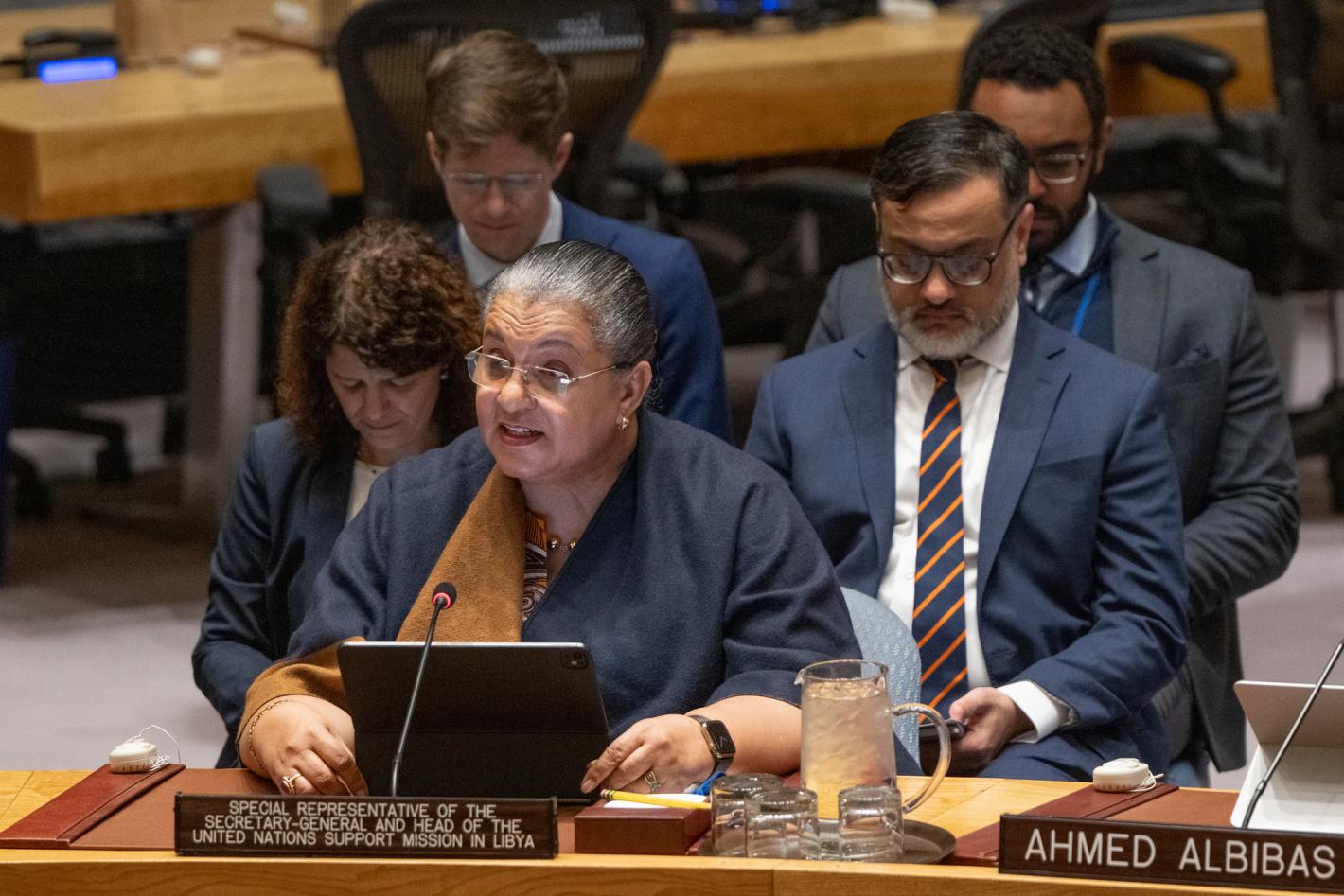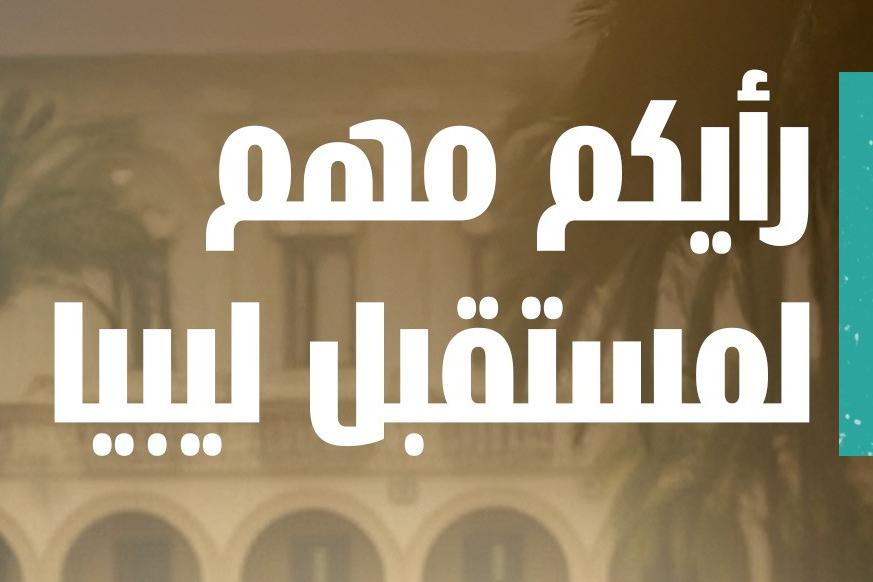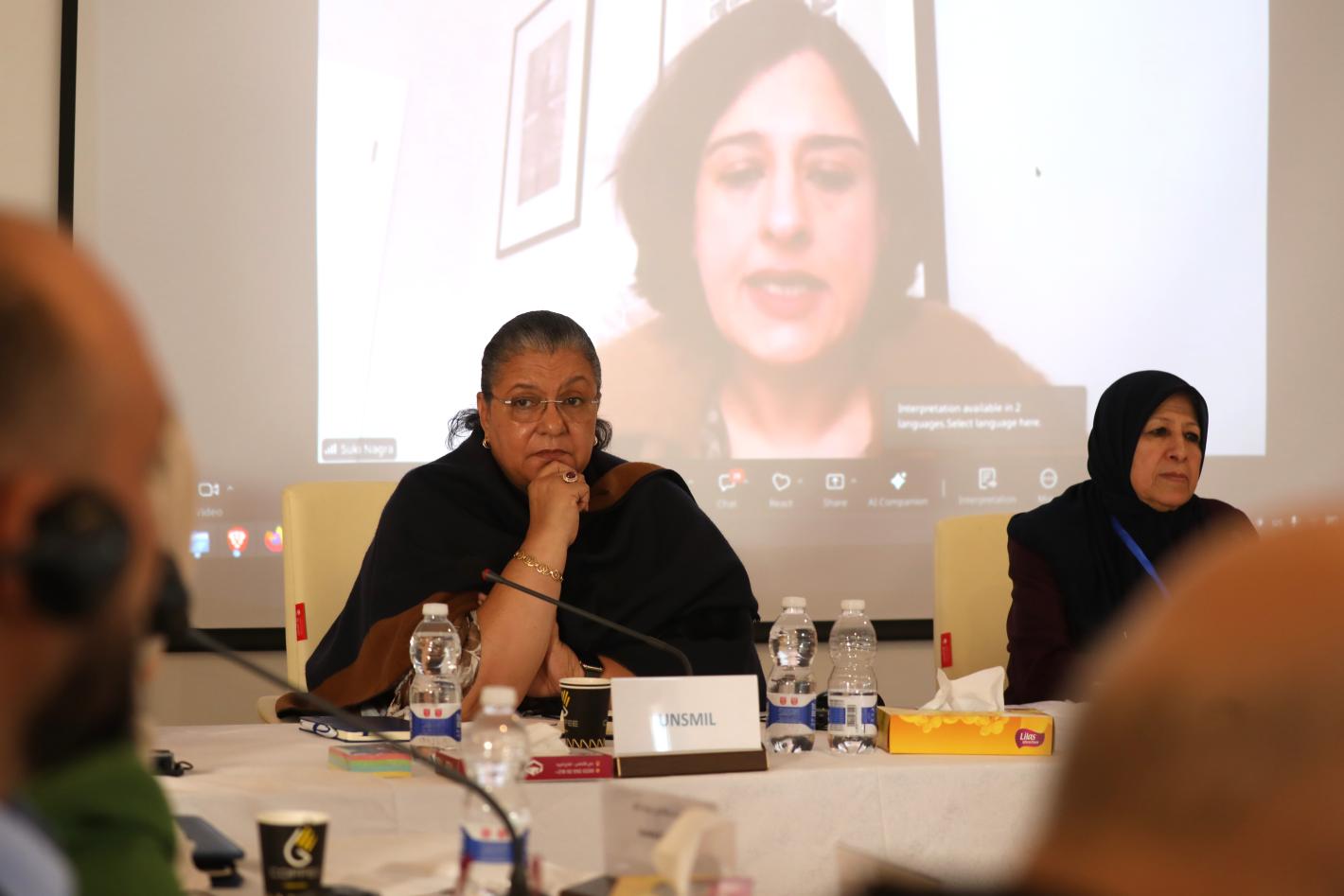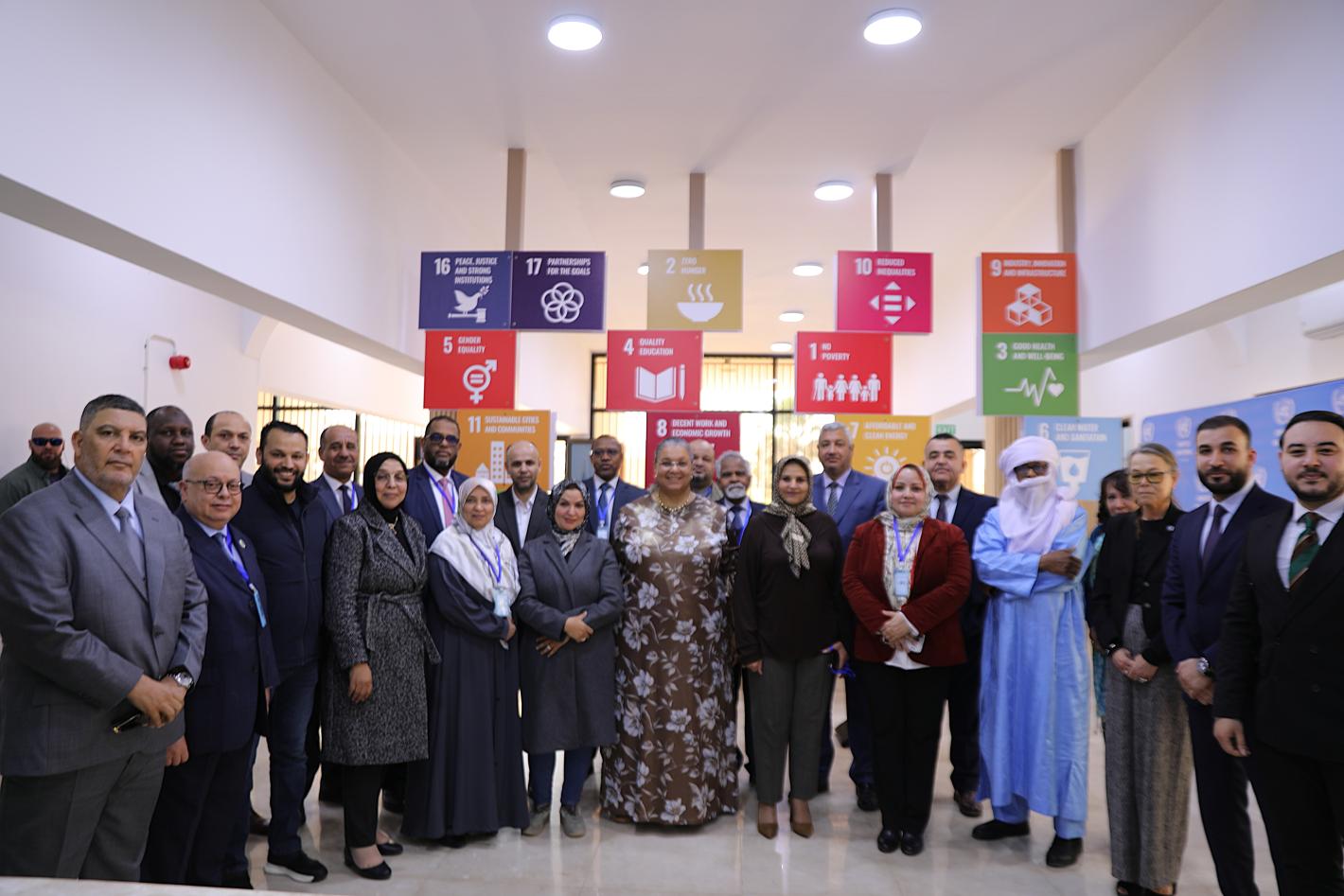السيد الرئيس، سعادة السفير هوانج من جمهورية كوريا،
أعضاء المجلس الأفاضل،
أشكركم على إتاحة الفرصة لي لإحاطتكم اليوم بشأن الوضع في ليبيا. في مستهل حديثي أود التقدم بأطيب التمنيات للشعب الليبي والمسلمين كافة بمناسبة عيد الأضحى المبارك عسى أن يكون فرصة لأولئك الذين يعانون كي ينعموا ولو بقسط قليل من الراحة. هذا العيد هو أول عيد أضحى بعد فاجعة درنة وفيه نستحضر ذكرى من فقدوا أرواحهم في هذه الفاجعة الأليمة، غير أن الليبيين أظهروا تمسكاً ملفتاً بأواصر الوحدة والقدرة على الصمود في وجه المحنة التي ألمّت بهم.
منذ أن توليت مهام القائمة بأعمال رئيس بعثة الأمم المتحدة للدعم في ليبيا ومنصب نائبة الممثل الخاص للأمين العام للشؤون السياسية، شرعت في مشاورات للاستماع لهواجس الشعب الليبي وأولوياته بما في ذلك آراؤهم بشأن عملية سياسية شاملة للجميع يقودها الليبيون ويملكون زمامها. وحتى هذه اللحظة، أجريت لقاءات في مدن من شرق البلاد وغربها مع قيادات سياسية ومسؤولين وأكاديميين ومنظمات المجتمع المدني ومجموعات نسائية وقيادات عسكرية وممثلين عن المكونات الثقافية وأصحاب الأعمال بالإضافة إلى أعضاء المجتمع الدبلوماسي. وما تزال هذه المشاورات مستمرة وسوف أجري زيارات أخرى لمناطق أخرى في البلاد، بيد أني سأطرح أمامكم بعضاً من ملاحظاتي حتى هذه اللحظة.
أعربتْ الأغلبية الساحقة من المواطنين الليبيين عن الحاجة للتوصل إلى اتفاق سياسي كي يتسنى إجراء انتخابات وطنية ذات مصداقية تفضي إلى إعادة الشرعية لجميع المؤسسات. وقد ناقشتُ ضرورة وجود عملية تتحرى الشمول يقودها الليبيون لتخطي الجمود السياسي ومساندة الشعب الليبي في تحقيق تطلعاته نحو السلام والاستقرار والازدهار والديمقراطية. وقد طرح الليبيون أفكارهم حول الشكل الذي يفترض أن تكون عليه أية عملية سياسية تُجرى في المستقبل، بما في ذلك دور الأطراف المؤسسية الليبية الخمسة الرئيسة، ومن ضمنها مجلسا النواب والدولة، أو حوار بمشاركة أوسع، أو مزيج من هذا وذاك، فضلا عن مبادرات أخرى.
وقد نوّه العديد منهم إلى أهمية تبني "ميثاق" أو اتفاق يؤكد، من جملة الأمور التي يؤكدها، احترام الأطراف للنتائج التي ستفضي إليها الانتخابات. وبالمثل، شدد البعض على أهمية إدراج ما يكفي من تفاصيل وآليات تنفيذ أي اتفاق مستقبلي لضمان التزام الأطراف ببنوده.
كما طرحوا أيضاً أفكاراً حول خريطة طريق تتناول الجوانب الجوهرية بما فيها ما إذا كان يتوجب التركيز على الإشكاليات المتعلقة بتشكيل حكومة مؤقتة والخطوات الكفيلة بالتوجه نحو إجراء الانتخابات. وأعرب البعض من المواطنين والمسؤولين عن ضرورة الوقوف على المسببات الجذرية للنزاع مع التركيز على الإشكاليات المتعلقة بالاقتصاد والبنيات الأمنية وهياكل الحكم في ليبيا وضرورة تعزيز اللامركزية والشمول والإنصاف والشفافية.
ويواصل العديد من الليبيين الإعراب عن مخاوفهم العميقة إزاء واقع الانقسام على الأرض ووجود مؤسسات حكم موازية. وأنا أشاطرهم هذه المخاوف. إن هذه التطورات كفيلة بزعزعة الاستقرار الاقتصادي والأمني ناهيك عن تقويضها لسيادة ليبيا ووحدة وسلامة أراضيها وسط مخاوف بشأن تأثير التوترات الجيوسياسية على ليبيا.
السيد الرئيس،
بالإضافة إلى حل سياسي وطني، شدد العديد من الليبيين أيضاً على ضرورة إجراء انتخابات محلية، وهي خطوة مهمة لضمان تحقيق المساءلة عن تقديم الخدمات وإعادة الشرعية لقسمِ هام من المؤسسات الليبية. وفي 9 حزيران/ يونيو، أطلقت المفوضية الوطنية العليا للانتخابات عملية تسجيل الناخبين للانتخابات البلدية في 60 بلدية في جميع أنحاء ليبيا. وحتى الآن، سجل أكثر من 36000 مواطن في مراكز التسجيل بالحضور الشخصي ومن خلال نظام الرسائل النصية القصيرة. وهذه خطوة هامة، على الرغم من أن تسجيل الناخبين، وبالأخص الناخبات، يبقى منخفضاً إلى حد ما. وتبذل المفوضية الوطنية العليا للانتخابات، بدعم من البعثة، جهوداً لتشجيع المزيد على التسجيل.
علاوة على ذلك، وحتى عشية عيد الأضحى، تم منع افتتاح 10 من أصل 12 مركزاً للتسجيل بالحضور الشخصي في عدد من بلديات شرق ليبيا. وهنا أحث السلطات على السماح بفتح تلك المراكز وتمكين الليبيين من التسجيل وممارسة حقوقهم السياسية.
السيد الرئيس،
إن الحد من النزاعات والحفاظ على الاستقرار يظلان في طليعة اهتمامات أغلب الليبيين. ففي شهر نيسان/ أبريل، حدثت اشتباكات قصيرة، لكن عنيفة، في منطقة عين زارة المكتظة بالسكان في طرابلس. وفي مواجهة خطر مزيد من التصعيد في العاصمة، شارك قادة التشكيلات المسلحة بنجاح في جهود الحوار لتهدئة الوضع. وفي شهر أيار/ مايو، جاءت الاشتباكات المتفرقة التي وقعت بين مجموعات مسلحة في منطقتي الجميل والزاوية، وتفجير سيارة مفخخة في طرابلس الأسبوع الماضي، فضلا عن التقارير التي تفيد باستمرار حشد السلاح داخل البلاد، جاءت كلها لتشكل تذكيراً صارخاً بهشاشة المشهد الأمني في ليبيا. هذه الديناميات تؤكد الأهمية البالغة لتوحيد وإصلاح المؤسسات الأمنية، وأهمية جهود الوساطة المحلية.
وبينما لم يُسجل أي انتهاك لاتفاق وقف إطلاق النار خلال الفترة التي تغطيها هذه الإحاطة، إلا أن التقدم في انسحاب القوات الأجنبية والمقاتلين الأجانب والمرتزقة ما يزال متعثراً. وقد أدى الوضع الأمني في عدد من دول الجوار، من بين عوامل أخرى، إلى تعطيل التواصل الذي بدأته اللجنة العسكرية المشتركة (5+5) مع لجان التنسيق التي أنشأتها هذه الدول للتعامل مع هذا الأمر.
ويتعين بذل المزيد من الجهود من جانب السلطات الليبية للتصدي للألغام الأرضية والمتفجرات من مخلفات الحرب. وقد أفادت تقارير عن إصابة اثني عشر طفلاً في أوباري وطرابلس خلال شهري نيسان/ أبريل وأيار/ مايو لوحدهما.
السيد الرئيس،
بالنسبة للعديد من الليبيين، بات الوضع الاقتصادي أشد صعوبة، إذ تواجه الأسر والأعمال التجارية الصغيرة ارتفاعاً في الأسعار، وانخفاضاً في القوة الشرائية أو صعوبة في الحصول على النقد. إن الثروة التي تنعم بها ليبيا لم تُترجم إلى توزيعٍ عادل للموارد وولوجٍ للخدمات وحصولٍ متكافئ على الفرص لجميع الليبيين، ولا سيما الشباب والنساء. لذا، فإن توحيد الميزانية الوطنية ضرورة قصوى، وأحث هنا أصحاب الشأن كافة على حل ما تبقى من خلافات لضمان إقرار الميزانية بشكل سريع والاتفاق على تنفيذها على نحو يتسم بالشفافية ويخضع للمساءلة.
وفيما يتعلق بوضع حقوق الإنسان، يساورني قلق عميق إزاء التقارير التي تفيد بوقوع انتهاكات في جميع أنحاء البلاد، ولا سيما النمط المتكرر من الاختطاف أو الاعتقال والاحتجاز التعسفي لليبيين. ففي 17 أيار/ مايو، اختفى عضو مجلس النواب إبراهيم الدرسي في بنغازي. وفي 19 نيسان/ إبريل، توفي الناشط السياسي سراج دغمان في ظروف غامضة أثناء احتجازه في بنغازي. وما يزال النائب حسن الفرجاني، من بين آخرين، محتجزاً بشكل تعسفي في طرابلس. وقد دعت البعثة إلى إجراء تحقيقات شفافة ومستقلة في جميع حالات الوفاة أثناء الاحتجاز وفي حالات الاختفاء، وإلى إطلاق سراح المحتجزين تعسفياً.
كما لا يزال المهاجرون واللاجئون وطالبو اللجوء يتعرضون أيضاً للاحتجاز التعسفي والتعذيب والابتزاز والعمل القسري والترحيل. وهنالك حاجة إلى إطار قانوني وسياسي شامل لمعالجة وضعهم وإدارة موضوع الهجرة بما يتماشى مع المبادئ الدولية.
وفي ضوء الحرب المروعة في السودان وتأثيرها على ليبيا، أطلقت وكالات الأمم المتحدة والشركاء في المجال الإنساني يوم 28 أيار / مايو الماضي، بالتنسيق مع السلطات الليبية، خطة الاستجابة لعام 2024 للاجئين السودانيين في ليبيا. وتنص الخطة على مبلغ 43.8 مليون دولار لتلبية احتياجات الأفراد المستهدفين والمتوقع أن يصل عددهم إلى 195,000 شخص، ويشمل ذلك اللاجئين السودانيين والمجتمعات المحلية المضيفة.
السيد الرئيس،
إن التطورات التي ذكرتها آنفاً تبين هشاشة الوضع والاحتياجات الكثيرة للشعب الليبي والتحديات المتعددة التي يواجهها. لذا فإن البعثة وأسرة الأمم المتحدة في ليبيا تواصل دعم نهج متعدد الجوانب لمعالجة هذه القضايا المثيرة للقلق، بما في ذلك تعزيز العمل بشأن الأولويات الاقتصادية والأمنية وحقوق الإنسان، إلى جانب الجهود السياسية.
وفي خطوة مشجعة، تواصل الرئاسة المشتركة لمجموعة العمل الأمنية مناقشاتها الداخلية ومع اللجنة العسكرية المشتركة (5+5) استعداداً للاجتماع المقبل لمجموعة العمل الأمنية المعنية بليبيا. كما تعكف الرئاسة المشتركة لمجموعة العمل الاقتصادية أيضاً على مناقشة جدول أعمال لاستئناف عملها في دعم الجهود الليبية. وتنخرط المجموعة المعنية بالقانون الدولي لحقوق الإنسان والقانون الدولي الإنساني أيضاً في دعم الجهود الوطنية الوطنية للتصدي للاحتجاز التعسفي، ولجهود تحقيق مصالحة وطنية قائمة على الحقوق.
من الأهمية بمكان دفع عملية المصالحة الوطنية قدماً وأشيد هنا بعمل المجلس الرئاسي ولجنة العدالة والمصالحة بمجلس النواب لاتفاقهما على مشروع قانون واحد للمصالحة الوطنية والعدالة الانتقالية يحفظ حقوق الضحايا ويلتزم بالمعايير الدولية. وأدعو جميع الهيئات ذات الصلة إلى الانخراط بنفس الروح كي يتسنى اعتماد هذا التشريع الحيوي على أساس التوافق. والبعثة، جنباً إلى جنب مع الاتحاد الأفريقي، على استعداد لمواصلة التيسير وتقديم المشورة الفنية.
كما تواصل البعثة دعم الجهود الليبية من أجل تمكين الشباب والنساء بشكل أكبر. وقد أعرب الشباب الليبي عن رغبتهم في القيام بدور فعال في إيجاد الحلول لمجتمعاتهم المحلية وصياغة مستقبل بلادهم. واتساقاً مع قرار مجلس الأمن رقم 2250 لسنة 2013 بشأن الشباب والسلام والأمن، أطلقت البعثة في أيار/ مايو استراتيجيتها الجديدة لإشراك الشباب، والتي تركز على التدريب والمناصرة والتشبيك بهدف تمكين الشباب.
وفي حزيران/ يونيو، اختُتم بنجاح برنامج "رائدات" التدريبي السنوي الأول والذي استفادت منه 30 من القيادات النسوية الشابة. وقد تم تنفيذ هذا البرنامج بالتعاون بين أسرة الأمم المتحدة في ليبيا، والمفوضية الوطنية العليا للانتخابات، ووزارة التربية والتعليم. وسيتم إطلاق الدورة التدريبية الثانية في شهر أيلول / سبتمبر المقبل.
أعضاء المجلس المحترمين،
في الختام، ثمة توافق بين أوساط الشعب الليبي على ضرورة الدفع قدماً بالعملية السياسية، فالوضع القائم غير قابل للاستمرار. وبينما تتعمق الانقسامات المؤسسية والسياسية، فإن عامة الليبيين يتوقون إلى السلام والاستقرار والازدهار والمصالحة. لذا بات من الضروري القيام بعمل حازم وموحد من جانب الليبيين وبدعم من المجتمع الدولي لإحراز تقدم في العملية السياسية.
شكراً لكم.






